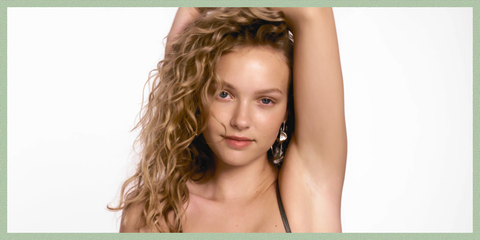Take a minute to think about your skin as if it were your stomach. Imagine eating a diet full of processed foods containing preservatives, stabilizers, artificial sweeteners, and filler ingredients like high-fructose corn syrup. Not only would you miss out on all the nutrients and antioxidants needed to maintain optimal health, but you would damage your gut by killing the positive bacteria that help absorb nutrients when you do decide to eat a vegetable. “It's the same thing on the skin,” says holistic aesthetician Kristina Holey. “If you’re using conventional beauty products with a ton of preservatives, fragrances, and stabilizers, you’re going to damage the skin’s microflora, which will impair your skin function and have the worst impact for skin quality and appearance.”
For Holey, clean skin care means using nutrient-dense ingredients (while avoiding damaging chemicals) to support and nourish the skin’s bacteria for effective results. She adds that buying local is important: The longer the shelf life of a product and the farther it traveled, the more additives and preservatives you’ll find in the ingredient list. The biggest issue? The long-term health implications of these added compounds can be more than skin deep.
Of the 82,000 ingredients used in personal care products, one in seven have been found to be industrial chemicals that are well-established carcinogens, pesticides, and hormone disruptors. Your favorite skin care products could contain anything from plasticizers (chemicals used to keep concrete soft) to degreasers (used to get grime off auto parts) to surfactants (used in paint and inks). Although these ingredients are considered safe by the FDA for acute exposure, because of the low quantities used in beauty products, there is a lack of studies looking at chronic exposure. “If we know these chemicals are dangerous at high exposures, we can't assume that just because levels are low that they're safe when used over a long period of time,” explains Sarah Ballantyne, Ph.D. “We need actual data to prove that, and that doesn't exist yet.”
However, when it comes to endocrine disruption, the discussion around acute and chronic exposure to skin care ingredients is more complicated. “Endocrine disruption isn't really dose dependent,” explains John Warner, president of Warner Babcock Institute for Green Chemistry. “It's operating at the hormonal level, so you really don't a whole lot of chemicals in order for it to disrupt your hormones.” And everyone reacts differently: “An old 56-year-old guy like me probably has a very different response than a pregnant woman in her 15th week of pregnancy,” he explains.
Both Ballantyne and Warner are frustrated at the lack of information regarding endocrine disruption caused by skin care products, and both believe we need a ground-up solution for looking at toxicology in the beauty industry. “No university requires a chemist to have any training in what makes molecules toxic, what makes molecules harmful,” Warner reveals. “Before someone gets a degree in chemistry, a university should require them to learn something about predicting the negative impact [of what they’re inventing]. The reason there's no answer to this question is because chemists, the only people who understand molecular structure, aren't part of the discussion. And that's crazy. How could they not invent dangerous stuff if they have no clue how not to?”
The good news is that there are dozens of beauty brands leading the charge, with enlightened chemists crafting effective products made from 100 percent clean and safe ingredients for any exposure. But as you look to overhaul your bathroom cabinet, Warner has one final piece of advice: Don’t panic or feel overwhelmed. “We don't want to be putting our hands up over our heads running in circles screaming ... because the stress of panic is probably more toxic than the exposure of the molecules.”
With that in mind, we have found, tested, and vetted the best clean skin care brands out there, so you don’t have to spiral into a three-hour Google search yourself. When used properly, these natural alternatives are some of the best wrinkle fighters and collagen boosters on the market. For younger, clearer, smoother skin, these are the clean skin care brands BAZAAR.com editors stand behind.














